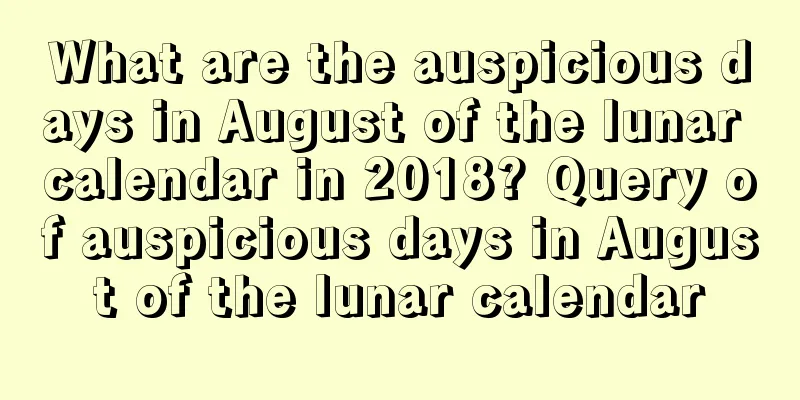What are the taboos on the sixth day of the Lunar New Year? Is this a good day?

China is a relatively traditional country, so people are very particular about how they behave in daily life. So what are the taboos on the sixth day of the Lunar New Year? Let’s find out together. The Fortune Teller website provides you with more information related to the first month of the lunar calendar in 2018. You are welcome to learn more about it!What are the taboos on the sixth day of the Lunar New Year?The sixth day of the first lunar month is also known as "Horse Day". Since the Qin and Han Dynasties, the traditional view is that the first day of the first lunar month is the Chicken Day, the second day is the Dog Day, the third day is the Pig Day, the fourth day is the Sheep Day, the fifth day is the Ox Day, the sixth day is the Horse Day, and the seventh day is the Human Day.Legend has it that this is because when Nuwa created all living things, she first created the six domestic animals and then humans, so the first six days of the lunar month are all days for the six domestic animals. The sixth day of the first lunar month is the Horse Day: go to the fields to prepare for spring ploughing, and send away the poverty. The sixth day is the Horse Day, known as Yifei in ancient times. People really start working or doing business on this day. Since the beginning of the first month of the lunar year, the toilet cannot be cleaned until the fifth day, and feces accumulate in the toilet. So on this day, a thorough cleaning is done, and sacrifices are made to the toilet god to clean the usually dirty toilet. That’s why it’s called “挹肥” (but nowadays most families use new bathroom equipment, so this custom no longer exists). This day also represents the day when farmers in the old days began to go to the fields to prepare for spring ploughing. A Lunar New Year custom song circulated among the people of Guangzhou mentions "The first day of the first lunar month is to worship gods, the second day is to worship people, the third day is the poor ghost's day, the fourth day is to beg for rice, the fifth and sixth days are the New Year, the seventh day is to look for spring, the eighth day is not to come back, the ninth day is to have nothing, the tenth day is to beat spring, the eleventh day is to beat children, the twelfth day is to set up the lantern shed, the thirteenth day is to turn on the lanterns, the fourteenth day is to be brightly lit, the fifteenth day is to pray after the lanterns are lit, and the fifteenth day is to pick green to drive away all diseases." As the saying goes, on the sixth day of the Lunar New Year, pray for good luck and get rid of the poor ghost. "Sending away poverty" on the sixth day of the first lunar month is a very distinctive seasonal custom among the ancient Chinese people. The meaning is to offer sacrifices to the poor ghost (the god of poverty), also known as the "poor son". Is the sixth day of the Lunar New Year a good day?Fire and Water are not yet complete (Wei Ji hexagram), a middle to lower hexagram for unfinished business [Xiang said]: The ground is several feet deep above the person, so be careful of people who steal your camp and rob your village. Later, Tai Sui is regarded as an evil spirit, so be careful at all times to avoid disasters. This hexagram is composed of two different hexagrams (lower Kan and upper Li) stacked on top of each other. Li represents fire and Kan represents water. The fire is above the water and the fire overwhelms the water. The fire-fighting mission failed, so it is called "Wei Ji". The "Book of Changes" begins with the Qian and Kun hexagrams and ends with the Ji Ji and Wei Ji hexagrams, fully reflecting the idea of change and development.[Career]: You are at the final critical moment, and success or failure is right in front of you. Therefore, it must not be taken lightly. Self-control is very important, as is perseverance and, when necessary, prudent and moderate risk-taking in order to achieve success. [Business]: The market is on the eve of major changes and the outlook is not yet clear. This is the most difficult period. You must keep a cool head, do not take risks, do not overact, exercise moderation, observe trends, and decide on actions. 【Seeking fame】: Long-term efforts and pursuits will yield results. At the critical moment of success or failure, one should remain calm, resign oneself to fate and let nature take its course. [Going out]: Take positive action, it is very beneficial. [Marriage and love]: You have passed the difficult stage. If you continue to work hard and prudently, you will have a happy result. [Decision]: This hexagram means "unfinished", indicating a promising future and the possibility of full development. Therefore, we must adhere to the principle of moderation and achieve success in our careers with wisdom, moderation, integrity and humility. When facing life, one should just work diligently, try one's best, leave the rest to fate, and not worry too much about success or failure. |
Recommend
Is the Minor Heat solar term on June 9, 2022 an auspicious day? Can I get a haircut on the day of Lesser Heat?
The sixth lunar month is the last month of summer....
What is the fate of a person born in the beginning of summer in the year of the horse? Is it a good time to be born in the beginning of summer?
Introduction: The birth of every new life is worth...
Is it auspicious to move house the day before the beginning of autumn in 2020? What should you pay attention to when choosing a date for moving?
Introduction: Moving is an important matter, so yo...
Is it a good idea to pick up the car on the seventh day of the first lunar month in 2019?
For more details about the 2019 New Year and the ...
Is it a good idea to start renovation on October 19th of the lunar calendar in 2020?
Is it a good idea to start renovation on October 1...
2019 Lunar New Year 14th Auspicious Time, Query of Time
The arrival of the first month of the lunar calen...
What day is the third day of the Chinese New Year? What zodiac sign is 2018?
Introduction: The third day of the first lunar mon...
Is the eighth day of the eleventh lunar month in 2020 a good day to move?
Is the eighth day of the eleventh lunar month in ...
Is the fate of a boy born on September 16th of the lunar calendar in 2022 good or bad?
There are many factors that affect the development...
Is the 21st day of the first lunar month in 2020 not suitable for opening a new store?
Is the 21st day of the first lunar month in 2020 ...
Can I get married on the ninth day of the fourth lunar month in 2019? Can I get engaged and hold a wedding?
By April, everything is lush and green. Shuimoxia...
Ten principles for placing fish tanks in the office
Introduction: In addition to the orientation, lay...
Can we worship our ancestors on the seventh day of the ninth lunar month in 2022?
We offer sacrifices to our ancestors to liberate t...
When is the Cold Clothes Festival in 2018? Who are the great men and celebrities who were born on the Cold Clothes Festival?
The first day of October every year is the Cold Cl...
Analysis of the lunar calendar for August 12, 2019! What day is it?
Someone said: Time goes by so quickly every day, ...









